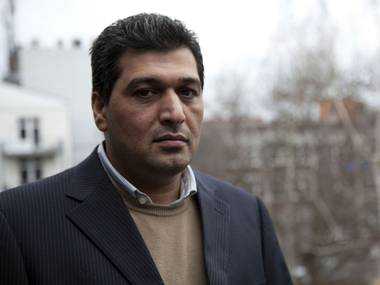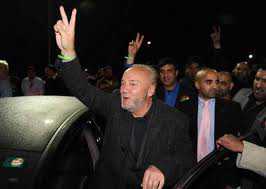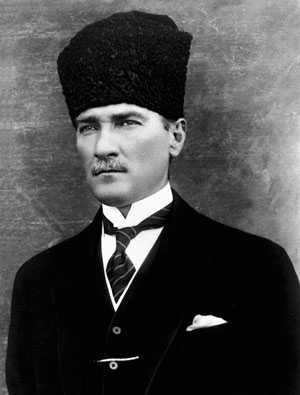And by 1688 Edward Lloyd, encouraged by the success of Rosee, had opened his own coffeehouse – Lloyds of London. It became an important meeting place for sailors, merchants, and ship owners and Lloyd kept them up to date with reliable shipping news. It was here that the modern insurance industry and stock market was born.
And Turkish coffee, or kahve, had been responsible.
The endlessly inventive milky, frothy, frappa-latte-chinos churned out by Starbucks today bear little resemblance to the thimbles of muddy exotica enjoyed by the 17th century renaissance gentleman. But if you visit Izmir today you can still taste a drink which has changed little in half a millennium.
And all in a setting that inspired Homer to pen The Iliad and encouraged Alexander the Great to stop conquering for a while and take in the view.
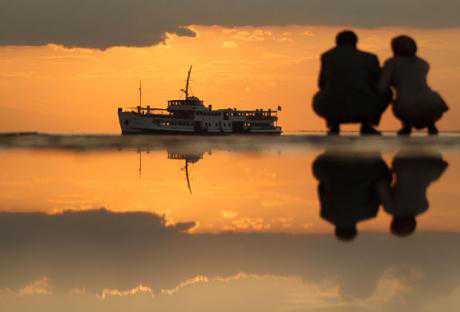
Prepared by boiling finely powdered roasted beans in a pot – or cezve – the coffee is left to settle into a thick, strong, sludge. The drinker can usually manage around four or five sips before the dregs at the bottom become too viscous to finish.
So ingrained is coffee in Turkish culture that the Turkish word for breakfast, kahvaltı, means “before coffee” while the word for brown is kahverengi, literally “the colour of coffee”.
The Turks believed coffee to be a strong aphrodisiac and a spouse refusing to drink it was a legitimate cause for divorce.
In Izmir you would be pushed to find a more tranquil or historically important spot to enjoy a cup than by the harbour. Dubbed “beautiful Izmir’ by the Turks, the city sits barely more than a few feet above the tideless Aegean, surrounded by mountains.
The climate is balmy and Mediterranean but the scorching summers are cooled by the refreshing sea breezes.
The palm lined promenade of Kordon is bustling with bars, restaurants and coffee houses and gives off an exotically evocative aroma of Shisha pipes, spices and, of course, coffee.
It faces west making it an ideal spot to catch the setting sun as it sinks into the harbour. The impressive Konak pier was designed by Gustave Eiffel. Its lattice work is based on the same engineering which holds up the Eiffel tower and the Statue of Liberty.
Almost all of the great ancient empires, the Lydians, Persians, Romans and Ottomans, to name but a few, have seen their empires rise and fall between the walls of Izmir.
And looking out across the water over to the mountains it is easy to see why settlers chose the port more than 8,500 years ago.
Legend has it that the city was founded by the Amazons and was originally named Smyrna after the warrior-queen of Hellenistic mythology. The city was the birthplace of Homer and The Iliad was first recounted on the banks of the Meles stream, between 750-700 BC.
Modern day Izmir, however stands on a slightly different spot to the original footprint of Smyrna, a curiosity brought about by Alexander the Great who according to legend was visited by the goddess Nemesis in a dream having stopped to rest on Mt Pagus, a hill outside the walls of the original city. Nemesis ordered the city be moved to the hillside.
Whether anyone seemed to object to such a whimsical uprooting of an entire city is not recorded. The oracle of Claros predicted the citizens would be four times happier than before.
Undoubtedly the city continued to prosper, largely driven by its location on important trade routes. Aristotle even travelled to give lectures nearby for three years.
Strabo, the ancient geographer wrote that Izmir was the most beautiful Ionian city of the time, even rivaling nearby Ephesus.
And a visit to Ephesus gives some hint as to how astonishing Izmir must have been in ancient times.
At its height, Ephesus was the capital of the Asian part of the Roman Empire and housed a population of 200,000. Although only partly excavated Ephesus is a vast sprawling reminder of how advanced ancient cultures were. It is still possible to walk down one of the multitude of ruined streets on a busy day in the tourist season and not encounter another soul.
Cleopatra, Marc Anthony and St Paul all visited the city and it held the magnificent Temple of Artemis, one of the seven wonders of the ancient world. Although the temple has now gone, the façade of the Celsus Library is arguably one of the most beautiful and impressive examples of Roman architecture left standing. It was the third largest library in the classical world. Visitors entering the library can still pass the same four female statues representing wisdom, character, judgement and experience.
Legend has it that Mary, the mother of Jesus, came to live near Ephesus with St John shortly before her death. Both Christian and Muslim pilgrims still travel to the small house on Mount Bulbul in which locals believed she died on August 15th every year. The grave of St John is also to be found nearby, under a later basilica.
Izmir finds itself at the crossroads of civilisations. It was the east of the west and the west of the east where culture, religion and mystics gathered and fused into elaborate tapestry. Mosques, synagogues and churches still sit happily side-by-side in testament to its embracing and liberal attitude.
It is no wonder that amid such a convivial atmosphere of acceptance that the coffee houses flourished when they were first introduced in the middle of the 15th century. And with them came a whole mysticism of their own.
While the Chinese were staring into tea leaves, a similar way of telling the future was being decoded from the coffee grounds in Turkey.
Even today the locals are quick to swipe your cup away and peer into the dregs to pick out the shape of a butterfly or a ring or a mounted rider.
And the mysterious potency of coffee travelled with the beans to London. It was said the new drink could stop headaches, cure wind, gout, scurvy, prevent miscarriages and sore eyes.
It is unsurprising that coffee took on such allure given the area from which it originated. Izmir has been famed as a spot for healing since ancient times.
The Agamemnon Spas which were cited by Homer are now known as the Balcova Spas and it is said their thermal waters can cure upper respiratory conditions, chronic infections, rheumatism, metabolism and skin problems. The spas at Cesme are also said to cure genealogical, urinary and liver problems. In the volcanic landscape of Alacati herbal baths are prepared using the waters which are renowned for treating bone and joint disorders.
The region is also peppered with Turkish bath houses. So if you don’t wish to drink the mud there will always be someone nearby to coat you in it.
Yet it is likely the famed good health of Izmir’s inhabitants was largely to do with the diet of its people.
Despite straddling two continents the cuisine of Izmir is far more European than Asian.
The oldest olive oil workshop in the world is found just 38km away in the fishing village of Urla, which dates from 4000BC. Aubergines, peppers and pumpkin and figs are all are all staples. Izmir’s Kofte, salted fish, and sardines cooked in vine leaves are famed throughout Turkey. In almost every street, carts sell freshly baked simit – a ring of bread coated in sesame seeds which is often eaten for breakfast.
Inland the plains are famed for aniseed, artichokes, onions, melons and tangerines as well as some of the only mastic tree gardens in the world. Herbs grown for salad dishes include mallow, stinging nettle, dandelions and teasel.
The fishing boats still bring in a steady stream of red mullet, guilt headed bream, sea bass and whiting while the vines of huge vineyards soak up the sun on the mountainside.
It is through its trade of such wines, food and oils as well as ongoing traditions of jewellery making and textiles that Izmir has flourished.
The ancient Agora is one of the best-preserved Roman market places in the world, its vast three story arches standing testament to the importance of commerce in the city.
The modern equivalent, the Kemeralti is similarly evocative. The old bazaar is a cavernous maze of jewellers, carpet sellers and, of course, coffeehouses.
So the next time you are handing over your change for a cup of coffee, it’s worth remembering the role Izmir played. And not only in the coffee. For the world’s first parchment was created here in ancient times which would eventually lead to paper, cardboard and the cup holding your drink. The first metal coin was also struck in nearby Sardis.
Izmir’s story is fascinating and well worth exploring. I could go on. But, strangely, I feel like stopping for a cup of coffee.
Details:
We stayed at the Movenpick in Izmir and flew with Turkish Airlines.
https://www.telegraph.co.uk/travel/destinations/europe/turkey/8678795/Wake-up-and-smell-the-coffee-in-Turkeys-beautiful-Izmir.html
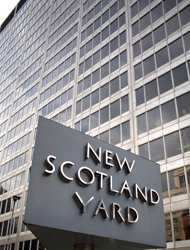 Highly-sensitive telephone conversations on Scotland Yard’s anti-terrorist hotline have been recorded by hackers.
Highly-sensitive telephone conversations on Scotland Yard’s anti-terrorist hotline have been recorded by hackers.
